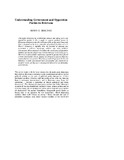| dc.contributor.author | Molomo, M.G. | |
| dc.date.accessioned | 2012-04-11T06:43:23Z | |
| dc.date.available | 2012-04-11T06:43:23Z | |
| dc.date.issued | 2000 | |
| dc.identifier.citation | Molomo, M.G. (2000) Understanding government and opposition parties in Botswana, Commonwealth and Comparative Politics, Vol. 38, No. 1, pp. 65-92 | en_US |
| dc.identifier.uri | http://hdl.handle.net/10311/995 | |
| dc.description.abstract | This paper discusses the relationship between the ruling party and
opposition parties in the struggle to capture political power in Botswana. It demonstrates the resilience of the multi-party framework that is founded on the basic principles of political freedom and civil liberty. Moreover, it explains how the poverty of ideology has presented a political landscape without any clear political
alternatives. More concretely, it outlines the weaknesses of opposition parties, that they do not pose any serious challenge to the ruling party.
However, in spite of their weaknesses, opposition parties have played a more constructive role in shaping the democratic process than has commonly been recognised. They have provided important checks and
balances to make government more accountable and responsive to
peoples' needs, yet they have not projected themselves as alternative
governments. | en_US |
| dc.language.iso | en | en_US |
| dc.publisher | Routledge, http://www.informaworld.com | en_US |
| dc.subject | Political parties | en_US |
| dc.subject.lcsh | Political parties--Botswana | en_US |
| dc.title | Understanding government and opposition parties in Botswana | en_US |
| dc.type | Published Article | en_US |
| dc.link | http://www.tandfonline.com/doi/pdf/10.1080/14662040008447810 | en_US |

